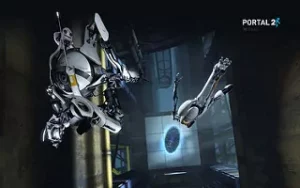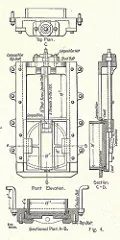
You fall off of a ledge, dropping through a hole in the floor, only to find yourself hurtling out the side of a wall like a cannon ball.
If you can imagine that easily, you have great spatial thinking skills. Or you’ve been playing Portal 2. Perhaps your spatial reasoning got a boost from playing Portal 2.
Spatial thinking is not just about fun and games. For example, the following mental activities are all heavily spatial:
- Planning a route by thinking of landmarks along the way
- Visualizing the structure of a protein molecule
- Examining an engineering drawing and mentally rotating the image
Spatial thinking is increasingly seen as a general cognitive skill, along with critical thinking. It may even be pivotal to success in science, technology, engineering, and mathematics (STEM) programs.

David Uttal of Northwestern University, along with his colleagues David Miller and Nora Newcombe believe in the importance of spatial thinking. And they have a growing body of evidence to back it up.
Uttal and his colleagues reviewed the research on the possibility of training spatial thinking, and the difference it could make for STEM education. They published their review, “Exploring and Enhancing Spatial Thinking: Links to Achievement in Science, Technology, Engineering, and Mathematics?” in Current Directions in Psychological Science.
Uttal’s team first tackled the question of whether spatial reasoning can be trained. Many studies have been completed on this issue, using a variety of training methods. Everything from abstract spatial exercises to video games to graphics units embedded in content classes.
The researchers examined the results of 206 previously completed studies. They calculated how strong of an effect training had for each study. Then they aggregated the findings across the studies.
Their conclusion was that spatial thinking can be improved with training. In addition, some versions of training show lasting effects. They also produce benefits that transfer to new spatial tasks.
Spatial Thinking in STEM

Uttal and colleagues also looked into research that relates spatial reasoning to performance in STEM. The idea is that STEM subjects often require reasoning with diagrams, graphs, model visualizations, and the like. Less work has been done on this issue. Yet, several studies suggest optimism.
In one study, high school students were assessed on their spatial reasoning skills. Those who scored higher were more likely to eventually make their careers in STEM fields. The effect was independent of math and verbal skills.
In another study, engineering college students who performed poorly on a spatial thinking test were invited for special training. Those who took it did better in later courses. One caveat of this study is that the students self-selected into the elective course. So, they may have been more highly motivated to succeed.
A follow-on experiment used a randomized controlled trial to overcome the problem. It also included highly gifted STEM students. For example, over a quarter of the participants had achieved perfect scores on their math SATs. The idea was to find out whether the training could improve performance in students who already had very strong spatial reasoning skills. The results were striking. Those who received the training in spatial thinking did much better in an especially challenging physics course.
These initial results are extremely encouraging. Much more research is needed to draw firm conclusions and to optimize training designs. One avenue is to integrate training on spatial thinking into core STEM courses. Infusing thinking skills practice in to specific course content is a generally accepted approach to improve the effectiveness of such training in everyday practice.
The National Science Foundation apparently agrees with the promise of spatial reasoning. They have founded the Spatial Intelligence and Learning Center (SLIC). SLIC is a large collaboration among professors at several universities to understand and enhance spatial thinking across the curriculum.
TeachSpatial is another interesting site that provides information and resources to improve spatial thinking.
The efforts underway are quite promising for the future enhancement of STEM education by identifying and nurturing key cognitive skills like spatial thinking.
While you grapple with best practices in your own classroom, you’ve got a great excuse to try Portal 2. It may well improve your spatial thinking skills. It will definitely bend your mind.
Image Credits: Warvan, Libertas Academica, FeeBeeDee
References

It seems to me that reason spatial intelligence effects success in courses such as physics and engineering is that it allows students to use visual imagery to help them memorize concepts which may have seemed previously intangible. For instance, if a student were being tested on the equation of a machine’s effect on work, instead of simply trying to regurgitate numbers, they would be able to better envision the function of said machine, and use this image to help recall the equation.
Thanks George. Interesting idea. That could well be one mechanism by which spatial thinking helps in STEM courses. It seems likely that there are reasoning and problem solving benefits in addition to memorization. For example, visualizing how a machine functions in order to diagnose a break down.
I think spatial thinking is associated with working memory, because building certain aspects of your working (short term) memory help you in what you do most often. For instance the article mentions that perhaps the spatial thinking was improved by playing Portal 2, this is also true for remembering a bunch of things at once ie the numerals in a phone number, orders of a family in a restaurant, etc. Very interesting article!
Interesting, Josh. Baddeley’s model of working memory separates out an auditory loop and “visuo-spatial sketchpad.” The auditory loop is where you say things over and over to yourself. The sketchpad part of working memory is where you visualize in the moment. The memory tasks you mention could be performed with either one, though using the sketchpad may give you an advantage – believe good wait staff use the visual strategy, for example.